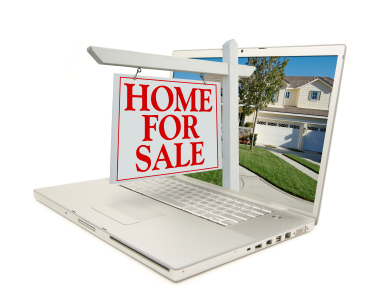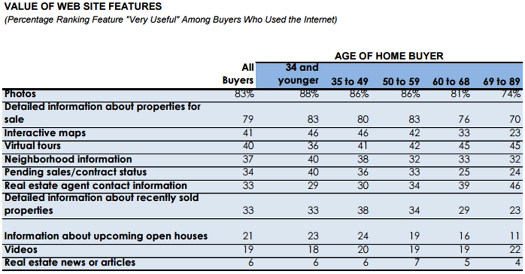You are viewing our site as an Agent, Switch Your View:
Agent | Broker Reset Filters to Default Back to ListAppraising Your Digital Property: Where Agents Should Be Online
August 10 2015
 Let's talk about property--digital property. These are virtual "places" like websites, social media and search portal profiles where prospects can find you online. Without a presence in the digital world, today's web savvy consumer will pass you by in favor of the competition. Buyers will never even know you exist. Sellers, on the other hand, will question why they should list with someone who can't even market themselves online.
Let's talk about property--digital property. These are virtual "places" like websites, social media and search portal profiles where prospects can find you online. Without a presence in the digital world, today's web savvy consumer will pass you by in favor of the competition. Buyers will never even know you exist. Sellers, on the other hand, will question why they should list with someone who can't even market themselves online.
That doesn't mean you have to join every social network you can find, however, or run out and buy single property websites for each of your listings. When it comes to building an effective Internet presence, it's better to leverage a few web properties well. Here's a rundown of which are most important.
Profiles on Property Search Portals
According to a joint study by NAR and Google, over 90% of consumers start their home search online. Thanks to the way they dominate search results, property search portals like Zillow and Trulia are often the first place those consumers end up. That's why it's crucial that you claim your profile on each of the top three portals.
If your brokerage or MLS sends listing data to portals, your name already appears on your listings. In the case of Trulia and Zillow, both display the listing agent's phone number and a link to their portal profile where consumers can see their other listings and read customer reviews. However, it's not uncommon for brokers that aren't meticulous about keeping track of their agents' contact info to send outdated phone numbers with their listing data. Claiming your portal profile will not only ensure that this information is accurate, it allows you to build a robust online property that's attractive to consumers. Be sure to add a recent headshot and solicit past clients for reviews for best results.
Agent Websites
Bad news, agents--that anemic page on your broker's website that lists your photo and phone number doesn't do a thing for your online reputation. You need a place of your own online! At minimum, your site should have IDX property search capabilities, neighborhood information, contact info, your listings, and links to your other digital properties.
Above all, though, your website should be valuable to consumers. To help you understand what today's consumer looks for in a website, see the following chart from the 2015 NAR Home Buyer and Seller Generational Trends Report:

Check with your broker or MLS before deciding on a website provider--they may have a vendor contract that offers agents websites for free or at a reduced cost. Then you can explore real estate website providers in our Product Directory.
Single Property Websites
When a home buyer finds a property they like, what's the first thing they do? They Google it! A listing's address is the most commonly searched term. Because the URL of single property websites are typically generated from a home's street address (e.g., 123MapleSt.c21.com), the sites have strong SEO and are easy to find online. They work wonders for your agent website's SEO, too, by providing crucial backlinks.
Again, if this is a type of online property you'd like to invest in, check with your brokerage first. You may have a low or no-cost option available to you. Century 21, for example, automatically generates customizable single property websites for each of their listings. You can learn more about your options for single property websites here.
Did you know that Facebook has over 1.4 billion active users? Clearly, the social network is a potent place to connect with leads. However, the nature of how you connect on Facebook is changing. Previously, real estate professionals typically created a business page on Facebook to promote their services. However, recent changes in the site's algorithm has rendered posts that business page owners don't pay to promote all but invisible. As a result, many agents are abandoning their pages in favor of connecting with consumers via their personal profile.
If that's the direction you've gone, remember to be a good Facebook "friend" to keep your engagement levels high. That means not spamming your followers with posts about your listings. Instead, share things that are genuinely meaningful to you and like, share, and comment on your connections' posts.
Other Social Media Sites
As we said earlier, it's better to master a few online platforms than produce lackluster results on many. If you're on Facebook, don't fret too much about being on others. If there are other social sites that you genuinely enjoy and are dedicated to posting on consistently, build a presence there, by all means!
Twitter is great for its networking possibilities and the ability to find and share hyperlocal information. Follow area businesses and media outlets and retweet updates on news and upcoming events for an easy way to create a local stream of information.
If you are a mobile shutterbug, Instagram may be a great fit. YouTube is particularly useful for connecting with buyers and sellers. According to NAR, it's the top place for video research (51% of users conduct research here). Consumers use YouTube to search for community information, to tour the inside of homes, and to learn how to find a real estate agent.
Tying It All Together
After you've decided where you want to establish your online presence, it's time to create an ecosystem where all of them link together. Be sure your portal profiles link to your website. Be sure your website links to all of your social media accounts and that each social account links back to your website. Same for single property sites--offer links to your main site and all of your social accounts.
Next, connect your real and virtual properties. This can be as easy as including your website URL on business cards and flyers. You can also consider using QR codes or text message marketing on your sign riders, posters, and beyond. This ensures that you connect with as many consumers as possible, from anywhere.









